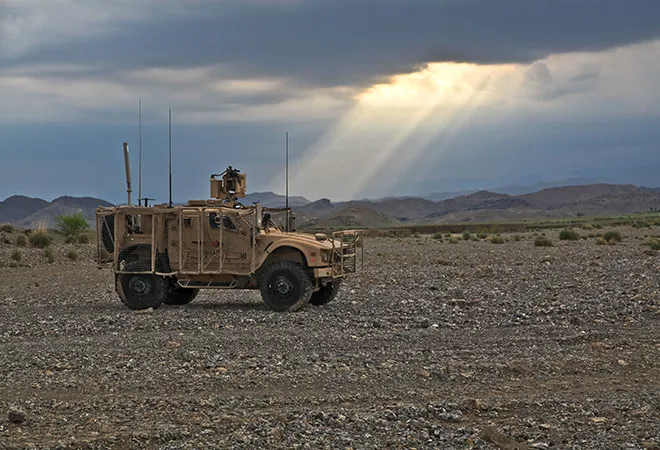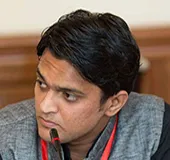
For the second time, US Special Envoy for Afghanistan Zalmay Khalilzad met Taliban officials in Doha on 14 November to discuss the issue of ending the war in Afghanistan. Taliban deemed the meeting as mere “preliminary talks” during which “no agreement was reached on any issue.”
Earlier this month, the Special Inspector General for Afghan Reconstruction (SIGAR) had submitted its quarterly report to the US Congress. Painting a grim picture, the report stated, “The Taliban now controls more territory than at any time since 2001.” Recently, the Chairman of the Joint Chiefs Gen. Joseph Dunford even went on to say that the Taliban are “not losing right now… we used the term stalemate a year ago and, relatively speaking, it has not changed much.”
In the meantime, Russia conducted the second meeting of the ‘Moscow format’ of consultations on Afghanistan on 9 November 2018. While no official representatives from the Afghan government attended the event, members from the non-official Afghanistan High Peace Council were present. This bore a continuity with regards to Afghan insistence on a Kabul-led approach. For instance, earlier this year, the Afghan government had categorically denied Russia’s offer to sponsor negotiations, stating that “the government will not participate in any further meetings that are not led by the Afghan government.”
These recent developments signify an Afghanistan held hostage by competing interests of Russia and the United States.
Russia has long insisted on the futility of the use of force in resolving the situation in Afghanistan. At the Tashkent Conference on Afghanistan (May 2018), Russian Foreign Minister Sergei Lavrov had stated that “the conflict cannot be resolved by force, no matter which strategies foreign capitals may approve.” He also raised concerns regarding the growing presence of the Islamic State in Afghanistan along the borders of Central Asian states. There is, however, little credence to Moscow’s claims regarding the presence of an estimated 10,000 Islamic State fighters — which remains insignificant as compared to the Taliban’s hold in Afghanistan. In August 2018, the Islamic State (IS) even lost control over its territories in the northern province of Jowzjan bordering Turkmenistan, when its 150 fighters surrendered to Afghan security forces.
There is, however, little credence to Moscow’s claims regarding the presence of an estimated 10,000 Islamic State fighters — which remains insignificant as compared to the Taliban’s hold in Afghanistan.
By underscoring the expanding influence of the IS in Afghanistan and beyond, Moscow intends to gather support from the Central Asian states to push for a political dialogue with the Taliban and undercut any lasting US military presence.
The US, under President Trump, has borne little success in America’s ‘forever war’. In announcing his administration's New South Asia strategy, Trump deemed the US effort as being geared “to fight and to win.” However, today the Afghan government merely controls 229 of 407 districts. The rest, 59 are controlled by the Taliban and another 119 continue to remain hotly contested between the Taliban and the coalition-backed Afghan security forces.
Inheriting the Obama-era train and advise mission in Afghanistan, President Trump grudgingly agreed to continue the US effort. Contrary to his original instinct to pull out, Trump’s approach led to a fresh infusion of US troops, greater operational latitude to theatre commanders, and an intensification of the US aerial bombings. This militarisation of US effort under Trump has borne Nixonian traits.
Similar to Richard Nixon’s approach in Vietnam to incessantly ramp up military strikes, gain on-ground initiative and coax the opposition to the diplomatic table, the Trump administration deemed “conditions on the ground — not arbitrary timetables” as its guiding approach. At first, this constituted a departure from the Obama administration’s approach — which also saw a surge in US troops but capped the presence with a predetermined withdrawal deadline.
However, a little over a year since the initiation of Trump’s New South Asia strategy, the results are little. For instance, Afghan security forces’ casualties have now reached the 1,000 mark for August and September alone, and the Taliban continues to occasionally overrun government-controlled towns. This has raised serious questions on the capabilities of U.S.-trained Afghan forces.
Inheriting the Obama-era train and advise mission in Afghanistan, President Trump grudgingly agreed to continue the US effort.. This militarisation of US effort under Trump has borne Nixonian traits.
In addition, both the Moscow and Washington led approaches hardly meet Indian interests due to their inclusion of the Taliban in the political solution.
Russia’s approach aims to maintain its channels with the Taliban to gain leverage in the negotiation process. Moscow’s motive appears to be to block any attempts by the US to maintain any form of military presence in post-conflict Afghanistan. Russia has also developed its relations with Pakistan to gain more leverage in the negotiation process. Recently, the two sides conducted their third joint military drills that began in 2016. Thus, dialogue with the Taliban and developed relations with Pakistan assures Russia an entry into the negotiation process and the post-conflict scenario.
Russia’s approach towards the negotiation process is at odds with India’s interests vis-à-vis Washington’s continued military presence in the country. India considers US presence in Afghanistan as a net security provider in the backdrop of Taliban’s increasing control. In view of India “lobbying for continued NATO presence in Afghanistan,” Russia is likely to garner support for its narrative through the SCO, if push comes to shove. Such a move would only isolate India in the regional grouping as the only voice that prefers some sort of American presence.
Hence, irrespective of the success of the Moscow-led talks, Indian concerns over the security of its investments in Afghanistan would not be assuaged.
On the other hand, the US’s approach seems to be centered on President Trump’s eagerness to wind up the war — now in its 17th year. Back in July, in order to “jump-start” Afghan negotiations, the Trump administration ordered its diplomats to engage directly with the Taliban, and in September, appointed noted US diplomat Zalmay Khalilzad as special adviser to Afghanistan.
India considers US presence in Afghanistan as a net security provider in the backdrop of Taliban’s increasing control. In view of India “lobbying for continued NATO presence in Afghanistan,” Russia is likely to garner support for its narrative through the SCO, if push comes to shove.
As in case of President Trump’s willingness to sign a peace declaration with North Korea without preconditions on its nuclear programme, direct talks with the Taliban undercut Washington and Kabul’s long-standing insistence on an “Afghan-led, Afghan-owned” diplomatic process.
Furthermore, talks have sputtered as the Taliban continues to pose serious tactical challenges to the foreign and local security forces’ efforts to hold on-ground advances. With over 100 districts continuing to be contested, the Taliban still has a fighting shot to gain more territories. Accentuating this trend are instances such as, the Taliban claiming an attack on Operation Resolute Support Commander General Austin Scott Miller and the killing of Kandahar Police Chief General Abdul Raziq. Such instances hamper coalition forces’ attempt to build self-reliant Afghan security forces and also impact prospects of peace negotiations.
Lastly, even if the Taliban is coaxed to the table following Gen. Miller’s recent vow to institute a more aggressive policy towards “regaining the tactical initiative,” the conflict would be far from over. Continued US military presence towards long-term American strategic considerations have proved to be the bone of contention in talks with the Taliban. The US has been insisting on at least two bases — Bagram and Shorabak — to remain under its control well beyond a political settlement. The Taliban has refused to even entertain this American demand as the Taliban’s “casus belli” for its insurgency has been the foreign occupation itself. Thus, the US holding talks with the Taliban — instead of an “Afghan-led, Afghan-owned” process, may not serve India’s interests of wanting a self-reliant, stable Afghan government. Notably, former US ambassador to Afghanistan Ryan Crocker has concurred with this view, stating direct talks between the US and Taliban “undermines the credibility of the Afghan government.”
In the end, India may have to simply read the writing on the wall to view the Taliban as “an indigenous force in Afghan society, part of the political fabric.” Since its ouster in the immediate aftermath of 9/11, most negotiating parties have considered the Taliban to be an important part of the post-conflict solution. While the international community insists on dialogue with the Taliban, India must also make efforts to be a part of the process and not let its interests be short-changed.
In such a scenario of competing Russian and American interests, Uzbekistan’s approach may prove to be India’s guiding light. Tashkent’s approach seems novel because no other Central Asian state has established channels with the Taliban.
Since Shaukat Mirziyoyev’s rise as its President, Uzbekistan has developed warm relations with Afghanistan. Relations have strengthened following talks over several investment projects, like a free trade zone at the Uzbek-Afghan border, a railway project connecting Mazar-i-Sharif with Herat, and the establishment of six textile factories by Uzbek companies.
In the end, India may have to simply read the writing on the wall to view the Taliban as “an indigenous force in Afghan society, part of the political fabric.” Since its ouster in the immediate aftermath of 9/11, most negotiating parties have considered the Taliban to be an important part of the post-conflict solution.
In addition, Uzbekistan kept Afghanistan by its side when it invited Taliban’s delegation to Tashkent in May 2018. Uzbekistan mainly discussed with the Taliban the security of existing and future investment projects like railroad and power lines. This investment security-focused approach may also bode well for India.
For New Delhi, Afghanistan is important from the perspective of connectivity to Central Asia. Uzbekistan, through its cordial relations with the Afghan government and an understanding with the Taliban, can assure the security of Indian investments in Afghanistan. Given India’s substantial contributions towards the Afghan reconstruction effort and its record as “a responsible aid provider,” banding with the Uzbeks for further investments and its security must be considered.
As an initial collaboratory project, India can consider accepting Uzbekistan’s invitation to participate in the 650-km long Mazar-i-Sharif - Herat railway project. Additionally, such cooperation can be of immense consequence towards India’s own grand strategic connectivity projects into the Eurasian landmass — like the International Transport and Transit Corridor, and the International North-South Transportation Corridor.
Certainly, the idea is not to rely solely on the Uzbekistan approach with regards to India’s stakes in a post-conflict Afghanistan. However, given the recurrent stalemates spurred by competing interests of the US and Russia, heeding to a fresh regional voice in the room may be New Delhi’s best out of a litany of the worst.
The views expressed above belong to the author(s). ORF research and analyses now available on Telegram! Click here to access our curated content — blogs, longforms and interviews.




 PREV
PREV



